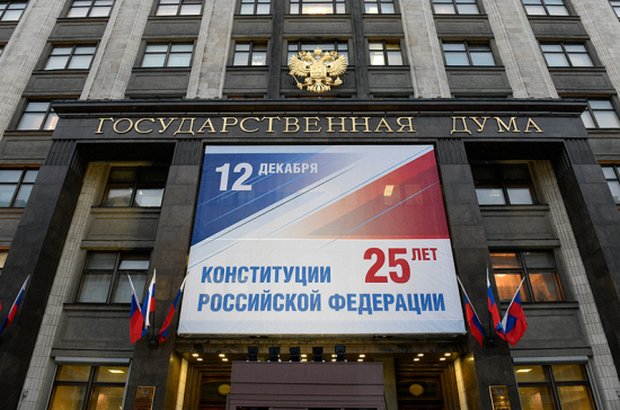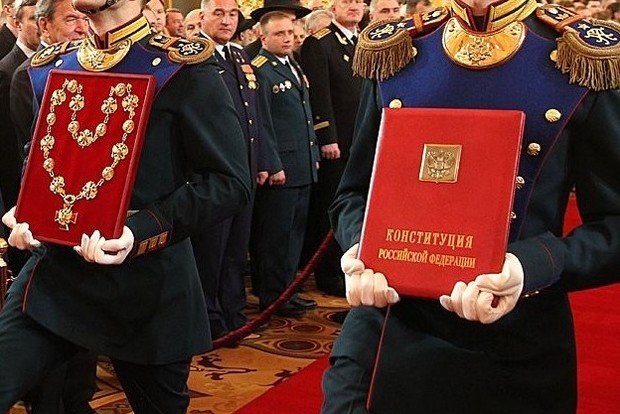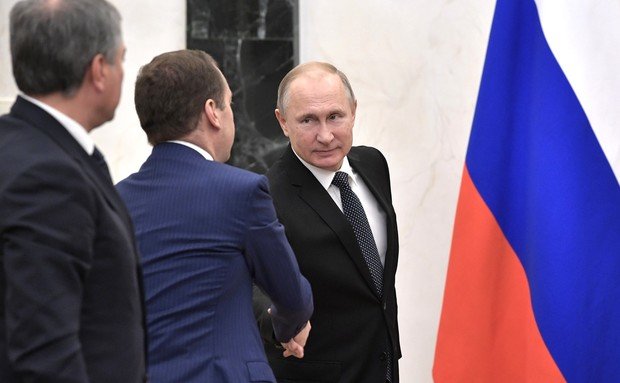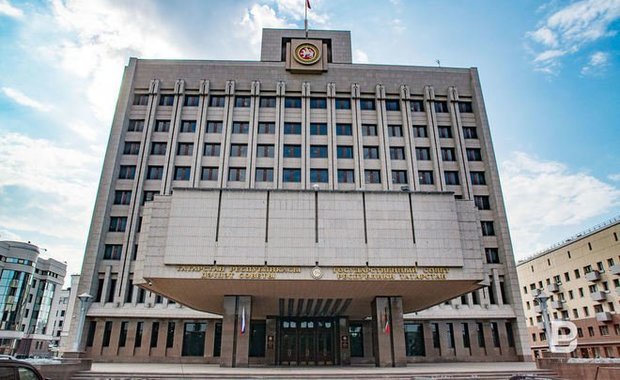''Now unitarity is highly explosive, and it’s not enough to appoint governors as 'guardians', it doesn’t help''
Georgy Satarov about uninformed Putin and potential powder kegs of the Russian political agenda
''When food reserve shrinks, unity in the political elite also suddenly falls. Competition of some groups in power will augment,'' thinks Presidents of INDEM Fund for Applied Political Research, political expert and sociologist Georgy Satarov. In an interview of with Realnoe Vremya, the expert tells why Russians don't think the current Constitution is theirs, threats of attempts of power to prolong the term of their authorities, if Putin knows everything and why the enlargement of Russian regions is a powder keg that's ''worse than in the late USSR''.
''The first effect of the Constitution linked with the activity of people in their ability to sue against the state''
Mr Satarov, the Constitution of Russia was 25 years last week. What has it given citizens and the state during this period?
The document itself can't give anything. It can give people something only when it's used. And I see the first effect of the Constitution linked with the activity of people in their ability to sue against the state. It was very surprising because it was people who got used to solving their problems by turning to the party committee or a local committee. But when they got a possibility to sue against power, they started to go to the court, go very often, challenging decisions of power or employers. And courts very often were on people's side – it was such a common occurrence that power had to resort to counter mass measures in the early noughties. And, in my opinion, it was an unsuccessful and awkward attempt – just look at the cancellation of different social benefits, augmentation of their targeted orientation and so on. In case of the cancellation of benefits, power, of course, took a back seat. But it decided to cancel benefits only in favour of mass claims of the citizens.
There were mass cases with the protection of constitutional rights, but also there were individual. Once I was at the airport, waited for my flight to Moscow and acquainted with a woman who told me a story. This woman lived with her family in a town outside Moscow, in the block of houses that belongs to Gazprom, in addition, they also worked at Gazprom. Once on the next election day, they with colleagues decided to vote an hour to the closure of the polling station. As they were eight people, they made a noise altogether, called the police and so cancelled results of the election in this station.
It's an example that the Constitute creates citizens, and this has also been happening for these 25 years. Another thing is that it happened on an insufficient scale, undoubtedly, and the state itself did little to ''bring up'' citizens in the population massively.

''The Constitute creates citizens, and this has also been happening for these 25 years. Another thing is that it happened on an insufficient scale.'' Photo: Yury Inyakin / pnp.ru
''People didn't start to consider this Constitution theirs because it wasn't born with their participation''
Does the latest meeting of the Russian President's Council for Human Rights with the president himself where he was told about many notorious cases, which wasn't seen earlier, mean that power started to respect human rights fixed in the Constitution less than when the same benefits? Or do I hasten to presuppose?
You formulated everything very correctly. As I said, the Constitution itself doesn't work if citizens don't use it.
Why don't Russians want to feel citizens? Why didn't the Constitution become something dear and important for them?
Talking about the generation of those who voted for the Constitution in 1993 (or didn't), it's was a generation spoilt by social practices of Soviet power to some extent. In addition, people didn't suffer from the Constitution. What did the politicisation during the first sessions of people's deputies mean? People voted for the first time by making a choice. And what happened at sessions was a result of their actions and their choice. And the 1993 Constitution was rather a result of the battle at the elitist level than some efforts of citizens.
Why was it created by elitists, not citizens? People were still interested in politics in 1993.
Circumstances are the point: the 1989-1993s were too turbulent – it was both a time of protection of what you voted for in 1989 and a time of disappointment. It's hard to blame people here. And due to the turbulent years, people didn't start to consider this Constitution theirs because it wasn't born with their participation. This is why, in general, they became indifferent to the Constitution year after year when actions of power could be called an infringement on it, for instance, the cancellation of governors' elections in the noughties.
Can the Constitution become close to the citizens 25 years later? What does it depend on?
Theoretically, yes, because social processes in Russia are unpredictable. It's quite possible to imagine a situation of some rude infringement on the Constitution, which can cause a serious wave, to all-Russian discontent. The last similar surge of activity was in December 2011, it was caused by changes in people's moods due to the exchange of posts between Putin and Medvedev: citizens considered they were insulted and became observers in Duma elections where they saw how their votes were stolen. The phrase ''in a row'' regarding the president's two terms also made them indignant. But when they saw their rights were violated in the elections made them indignant the most.

''Due to the turbulent years, people didn't start to consider this Constitution theirs because it wasn't born with their participation. This is why, in general, they became indifferent to the Constitution year after year when actions of power could be called an infringement on it.'' Photo: kremlin.ru
''The attempts of prolonging terms of being in power will have a more serious reaction today than in 2011''
How important do you think it is to make amendments to the Constitution of Russia in the next years? Chairman of the Constitutional Court Valery Zorkin and even Prime Minister Dmitry Medvedev told about it in their articles in the state mass media anyway.
It's a rhetorical question. Look, this already happened: changes to the Constitution were already made, the president and the State Duma's term of service were increased, there were changes in the composition of the federation's regions, there were adopted laws contradicting the Constitution – the same election of governor in 2004 (though the Constitution openly forbids to adopt laws oppressing and decreasing the volume of the citizens' rights). This is why the Kremlin, of course, can adopt amendments that, for instance, will increase the term of the current ruling team in power. Amendments are possible because they took place. Consequences of the prolongation of terms of being in power are other things: I will remind that the ''exchange of business'' in 2011 was an attempt to precisely prolong their ruling term. Though it's hard for me to forecast something in this respect, I will let myself make such a forecast – the attempts of introducing changes to the Constitution, which would have the same character, will have a more serious reaction today, comparably more serious than in 2011.
Do you mean the fall in the citizens' quality of life?
There isn't any direct relationship between political behaviour and economic factors – society perceives politics and the economy as different spaces. And there is some relationship between them, this relationship is quite indirect. Other mechanisms will work here, to put it roughly, ''we're fed up with them''. And it's a very significant stimulus and very significant argument for our people.
''Putin lives in a kind of information space''
Many people were surprised at the same session of the Council for Human Rights that Putin didn't know about the business council members told about. As Nikita Mikhalkov said, is it true that many things aren't reported to Putin and the president can not to know, in fact, about serious and notorious things?
Undoubtedly, he can. Putin lives in a kind of information space. In 2003, when Mikhail Khodorkovsky was arrested, I had a talk with one of those big entrepreneurs who went to entrepreneurs' meetings with Putin. I asked him: ''Probably you all have data on corruption in the higher echelons of power, why don't you use it?'' And he replied: ''We don't run a risk. The whole system depends on a thin thread of Putin's rating. And it's unknown what will happen if it suddenly breaks.'' And he added: ''Of course, we meet up, discuss what to say, what not to say. But most importantly we spend time not to say anything not to make him sad.'' The information space hasn't improved since then, and he perhaps has misconceptions of what's going on around.

''I had a talk with one of those big entrepreneurs who went to entrepreneurs' meetings with Putin. I asked him: ''Probably you all have data on corruption in the higher echelons of power, why don't you use it?'' And he replied: ''We don't run a risk. The whole system depends on a thin thread of Putin's rating. And it's unknown what will happen if it suddenly breaks.'' Photo: kremlin.ru
Doesn't it seem to you the president receives more and more addresses on human rights?
It's about how our courts work. One of the businessmen told me in 2004: ''We need nothing. If there were a normal court, all other problems would be solved on their own.'' This is why a normal court is needed, then there will be no need to address anyone.
By the way, Medvedev announced the ''era of courts'' in his article about the 25th anniversary of the Constitution.
Rubbish and out of touch with reality.
''The situation of the early 90s starts to be reproduced in Tatarstan''
Is federalism in Russia dead?
In the political practice, we are already a unitarian country. But such a big country with such management can't exist for long. And Yeltsin in the 90s managed to save Russia coming apart at the seams by his federalist statement ''Bite as much sovereignty as you can chew!''. Now unitarity is highly explosive, and it's not enough to appoint governors as ''guardians'', it doesn't help. Society decides everything. And I think the situation of the early 90s starts to be reproduced in Tatarstan. In any case, I see some signs at the top.
Why doesn't power want federalism to develop?
Everything comes from the fear to lose control, like ''How will people decide something there?'' No way. Power didn't need the experience of the dissolution of the USSR here.
Can Russian regions become larger when strengthening the unitarian state? Valery Solovey said 20 such enlarged territories might appear.
The attempt of such a decision is possible – within the same primitive ideas about manageability. They have been pulling the broken threads for 18 years and think if they change the number of regions, this will help to stay in place. It's fantastically naïve. But if duties of the federation's regions are transferred to the level of 20 regions, it will be a powder keg that's worse than in the late USSR.

''Society decides everything. And I think the situation of the early 90s starts to be reproduced in Tatarstan. In any case, I see some signs at the top.'' Photo: Maksim Platonov
Won't even the union of poor regions with rich calm citizens down?
It's naïve again to connect politics and economy. There was quite a tolerant economic situation in the USSR in 1989. Nevertheless, a free vote of citizens and readiness to choose those who say some bad words about power, that changes are needed, explained the appearance of the opposition at the Session of People's Deputies.
''The politicised youth will show off''
Is the influence of the so-called group of security officials in the Kremlin growing?
It's real, but I'd call this not growth of influence but growth of fight around the president. I think it's a fight for the post-Putin future, even their own future. Historians of political processes know that when the ''food reserve'' shrinks, the unity inside the political elite also suddenly reduces. Now we're seeing it, and, of course, the competition of some groups will augment.
And these groups– security officials, liberals, businesspeople close to the Kremlin – are equal. Or is it a misconception?
They are always unequal. They were unequal at the end of Putin's second term. Nevertheless, Putin instantaneously changed his mind on whom he will charge with ''guarding the throne'' in 2008 – the power faction lost then. Because it's not the case of the ratio of their power but the ratio of Putin's fear of options of choice.
We saw the youth's interest in politics for the first time in many years in 2017, though like participation in protests. Where is this activity now? Did it disappear as fast as it came?
Activity isn't monotonous and doesn't have waves, it undoubtedly changes. In addition, activity changes its forms, and we see it in power's behaviour that shifted its attention to the youth. This is why we shouldn't delude ourselves and grieve it went somewhere – it doesn't go anywhere, and the youth will show off.